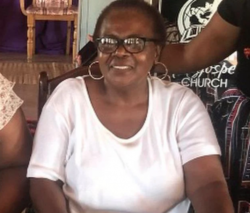Fikile Ntshangase (known locally as Mam’Ntshangase) was a vocal opponent of plans to extend Somkhele coal mine, one of South Africa’s largest open coal mines, situated on the border of iMfolozi-Hluhluwe Game Park, one of the oldest nature reserves in Africa, located in northern KwaZulu-Natal.
She was a leading member of the Mfolozi Community Environmental Justice Organisation, (MCEJO), which is currently involved in two legal challenges with Tendele Coal (Pty) Ltd. The first case is challenging all mining activities at Somkhele coal mine until Tendele Coal (Pty) Ltd. comply with all legal and environmental requirements and the second case is attempting to set aside the additional mining rights granted in 2016 which cover more than 222 square kilometres.
Many in the community oppose the mining project, asserting that insufficient public consultation had taken place before securing the mining rights and that their consent was not sought.
The mine Fikile was fighting against was described by The Global Environment Trust as causing “untold destruction of the environment and the homes and livelihoods of the residents of Somkhele”. Her mission went to the heart of so many battles around the world against devastating industrial expansion in the face of long-term environmental and economic sustainability.
The land, which was once used to graze goat and cattle, has been diminished. The park, which attracts tourists to the area and provides jobs, is reportedly impacted by the high level of dust and noise. Experts also link the dwindling population of white rhinos to the increase in the road network connected to the mine, with the area adjacent described as a “poaching hot spot”. Tensions have also been stoked between those whose families are reliant on salaries paid by the mine and those whose livelihoods are dependent on the land. The phrase ‘a battle of life and death’ is over-used in the media, but for too many, this is exactly what this is. And for Fikile, it was a battle in the midst of which she was needlessly killed. After her assassination, reports emerged of anonymous threats directed at other community members there, and in other parts of South Africa too, where communities have said ‘no’ to mining, even successfully fighting for the legal right to do so.
On Thursday 22nd October 2020, at approximately 6:30PM local time, four men entered Fikile Ntshangase’s house and shot her several times. At the time of the shooting, her young grandson was also in the house.
At the time of writing, an investigation is underway, but no arrests have been made.
Kirsten Youens, Fikile Ntshangase’s lawyer, said her client was a “courageous activist” against the expansion of the mine. “She was incredibly outspoken about the truth and justice, having no qualms about calling people out who she felt were being devious or untruthful,” Youens said. “She did not compromise her ethics. Ever. As her attorney, I will miss her truth, her fire and courage. She did not deserve to die. We are devastated by her loss.”
Shortly before her death it is alleged that Fikile Ntshangase turned down a bribe of R350,000 intended to get her to withdraw her support for the current legal cases saying, « I cannot sell out my people, and if need be I will die for my people ».
People near the mine have been the focus of threats of violence and intimidation in recent months, according to lawyers representing the communities. Families that have refused to be relocated from their ancestral lands have reportedly been shot at.

